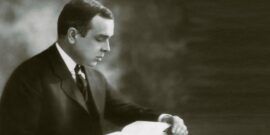As an epic vision of reality, Karl Marlantes’s Deep River takes up the enduring cultural theme of primitivism.
Reforming the 'Extra-Human' in Angola Prison
In 1944, the Hungarian moral and political philosopher Aurel Kolnai (1900-1973) wrote an essay that is indispensable reading for anyone wishing to understand today’s culture. Whether you are pondering the Left/Right split in our politics, the riddle that is Pope Francis, or the peculiar character of Western civilization and its ability to forestall its latest enemies, Kolnai’s “The Humanitarian Versus the Religious Attitude”[1] will help.
It’s very relevant to an issue that has moved to the fore recently: the health of our institutions dedicated to public order. Criminal justice and the prison system were the subject of a recent article by the Atlantic writer and reporter Jeffrey Goldberg, which the magazine has supplemented with a fascinating 13-minute video. Three viewpoints are interwoven in the Goldberg-narrated video about the Louisiana State Penitentiary in Angola, Louisiana: those of the inmates, the warden, and the reporter. Put differently, the viewpoints represent three emphases: the Christian, the managerial, and the humanitarian.
What is the video’s genre? To the readership at The Atlantic, prison reform. To those with an older vocabulary, crime and punishment.
A question put to an inmate sets the frame: How much has the Angola prison changed since the arrival of Warden Burl Cain? “It’s like night and day,” we are told. In 1995, Cain took over a penitentiary steeped in violence but through the sponsoring of associations, religious practice, especially Christian, and the distribution of responsibilities, significant calm prevails.
Warden Cain, explains an inmate, “opened the door of opportunity.” One man who drives a horse and buggy around the prison farm explains how much he loves his job. Another man in the fields says he’s always enjoyed hard work. A group of Christian men, calling themselves the “Malachi Dads,” help other men be engaged fathers to their children despite their incarceration.
In part, Goldberg’s piece is about education, but it is also meant to rehearse the familiar liberal conceit that religion, and especially Christianity, is a form of social control, used by authorities to pacify populations.
Indeed the warden is quite explicit that this is what he is up to. Cain tells viewers that he approached the running of the Louisiana State Penitentiary as a managerial problem and that religion came to his aid. Religious belief per se does not interest him, he says, but morality infused by religion has been his managerial ace in the hole. Religious morality teaches self-mastery and thus relieves him of the burden of harshly regulating the prison, which houses violent offenders including Louisiana’s death-row inmates.
Goldberg’s interest is rather more abstract. He takes up one of Warden Cain’s own ruminations. Here is a group of men, showing admirable purposiveness, men willing and able to make significant positive contributions to family, work, and society. How much better off the country would be, he muses, if it could establish conditions that would have tapped this potential before these men went down the path of crime and incarceration.
The underlying drumbeat of the piece is that significant numbers of them are in for life without possibility of parole even if the crime they committed was murder in the second degree. Several of them relate that, in a fit of anger, they killed someone but the perpetrator they were is now dead and gone. That man was young and reckless; the new man is older, wiser, and spiritually mature.
Goldberg tells the viewer that Louisiana needs reform, its sentencing regime is too punitive, that here is human potential unjustly held back. The video seems to hint that but for religious social control, these men would rail at the unjust system that has them in its grips, and that restricts them in their newfound potential. This last implication is incoherent—the potential and control have the same source, religion—but so is Goldberg’s echoing of the warden’s rumination.
The reporter’s editorial distance stems from his humanitarian attitude, which is not shared by Warden Cain. Cain’s point: Religion works in here, so why not publicly support it in these men’s lives before they encounter Angola? What works in the prison works everywhere.
Hopelessness pervaded Angola Prison; that is what changed. And here is Kolnai on the religious attitude: “man is no longer simply a hopeless exile lost in the vastness of things extra-human.” It is easy to see that hopelessness would grip most in the “extra-human” world of prison—but it’s a condition that even describes many of us who are not serving time.
That religion offers hope because it tames the “extra-human” is particularly evident in the visit Goldberg pays to Angola’s auto repair workshop. The students are younger men who hope to become mechanics upon release. Their teachers are older men serving life sentences without parole. Goldberg marvels that the inmates are responsible for all the hammers and screwdrivers being kept in the workshop. A senior teacher acknowledges this, and, when asked why he is inside, promptly answers: “For killing my wife.”
Here is something befuddling to the humanitarian. A mild man, a teacher, communicating a craft, shaping the potential of the young: yet a man held in prison without possibility of parole for killing his wife years ago when he was young and hot-tempered.
Christianity is less nonplussed. To the religious-minded, God has a claim on persons and imposes obligations. Since God is qualitatively distinct from everyday natural standards, these obligations are a heady brew of the caring and quixotic. This also means God’s demands are bound to be troublesome; they problematize our nature. Hence unsurprisingly, writes Kolnai, the religious attitude dwells on “the moral scissure in human nature.” Sin is a consequence and with it the need to propitiate the angry godhead, to purify the self by some technique of asceticism.
Contrary to the liberal view, religion stresses freedom. Persons are not locked in causal chains—poor education, deficient training—but are free to assert a perversion of will. Though mercy is always a possibility, the background to that possibility is that perverse assertiveness is met with divine retaliation. For this reason, it is possible to embrace punishment as a vehicle of asceticism. What the readership of The Atlantic is likely to see as an unjust waste of potential, a Christian can see as a freely wrought work of repentance.
The mechanic shop teacher, like the other men in the video, does not rage at the unfairness of his situation. What looks like pacification to the humanitarian is, to the Christian, witness. The will’s freedom to perversely set itself against the order of value is the same freedom that can channel punishment into peace. For the Christian, one is always free in relation to punishment.
Just as bad education and deficient training cannot compel the will, neither can punishment. Of the great Christian thinkers, it is Saint Augustine’s striking formulas that most confound the humanitarian. Perhaps some of the Christian men in Angola have read and understood what Augustine says about punishment in The City of God:
In that order of peace in which men are subordinate to other men, humility is as salutary for the servants as pride is harmful to the masters.
[1] Collected in Aurel Kolnai, Politics, Values, and National Socialism, edited by Graham McAleer, translations by Francis Dunlop (Transaction, 2013).



